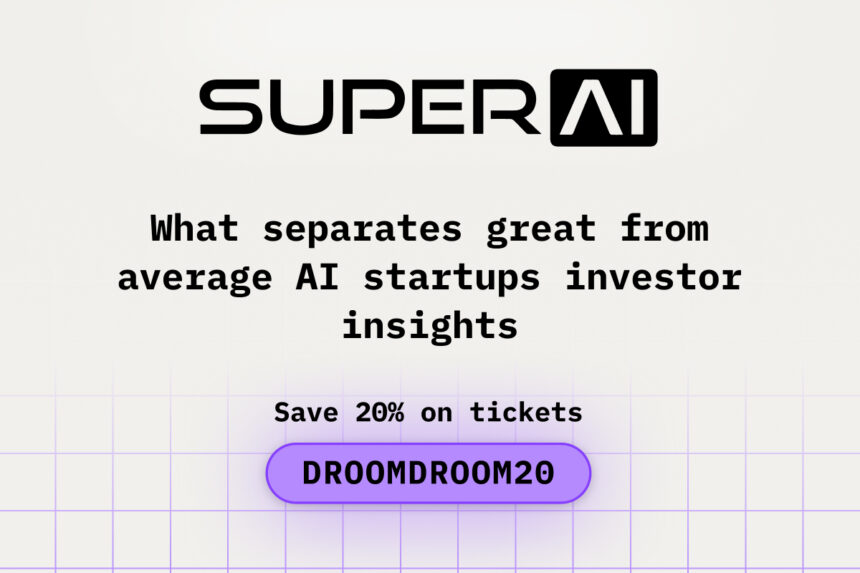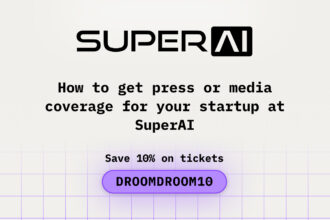With dozens of AI startups sprouting up every year, particularly around events like SuperAI, the question every founder should ask is: What really makes some startups stand out while others fade into the background? Investors don’t just buy technology; they buy credibility, defensibility, and prospects. Drawing from recent investor reports, conference panels, and real AI startup trends, this article explores what separates great AI startups from average ones.
- Strong Product-Market Fit with Credible Metrics
- Operable Technology & Scalable Infrastructure
- Clear Differentiation and Defensible Moat
- Efficient Use of Capital & Realistic Cost Structures
- Strong Leadership & Team Credibility
- Speed, Iteration & Feedback Loops
- Market Size & Addressable Opportunity
- Conclusion
Use DROOMDROOM20, the official SUPERAI promo code, to get 20% off ticket prices.
Strong Product-Market Fit with Credible Metrics
One of the most consistent lessons from investor conversations is that great AI startups demonstrate early and measurable product-market fit. Having a flashy demo is helpful for attention; consistent usage, retention, and engagement numbers are what convert interest into investment. For instance, metrics around gross margin, retention, or active user growth are repeatedly cited as baseline evidence that a startup is solving a real problem, not just chasing hype.
From recent reports, AI startups that hit meaningful engagement and retention metrics early tend to command better valuations. Investors often compare AI startup valuation norms today: those with solid traction can skip some early rounds thanks to credible data.
Claim your 20% discount on SUPERAI tickets by entering the official promo code DROOMDROOM20.
Operable Technology & Scalable Infrastructure
Great AI startups don’t just build models; they build systems. Investors differentiate between startups that can deliver production-grade, reliable AI versus those whose technology works only in controlled test environments. Key panels at AI enterprise forums emphasize clean pipelines, dependable inference (low latency, accuracy, stability), and infrastructure for scale (compute, model versioning, deployment).
Average startups often overlook these “boring” but critical parts—data pipelines, model ops, production monitoring. Great ones invest in these from early on. This clarity often shows up in how they talk about compute costs, optimization efforts, and fallback mechanisms.
Clear Differentiation and Defensible Moat
In a crowded AI landscape, what you do differently matters as much as what you do well. Investors highlight that many AI companies fail to stand out because they chase trends (agentic AI, LLM embeddings, etc.) without unique value propositions.
A recent analysis of the “Agentic AI reality check” pointed out that startups which avoid chasing hype and instead focus on specific user needs, edge cases, or verticals outperform those that try to be everything to everyone. Having defensible intellectual property, proprietary data, or a strong domain understanding creates staying power.
Use the official SUPERAI promo code DROOMDROOM20 now and save 20% on your ticket.
Efficient Use of Capital & Realistic Cost Structures
AI development is capital-intensive: cloud compute, GPU/TPU usage, data costs, specialized engineering. Great startups are clear about their cost structures, demonstrate discipline in managing burn, and show how they’ll scale margins. Investors look for gross margins that make sense after computing for inference costs, support, update cycles, and model improvements.
Reports on fundraising metrics for AI startups emphasize that AI companies must be able to explain how they’ll move from early investment to sustainable cost profiles, especially in infrastructure and human capital. Average startups often underestimate operational expenditure or ignore power and hardware cost realities.
Use the official SUPERAI promo code DROOMDROOM20 now and save 20% on your ticket.
Strong Leadership & Team Credibility
Investors often say a great foundational team separates high potential from average offerings. It’s not only about having strong technical talent but also someone who understands business, who has experience shipping products, handling failures, and being accountable. In AI, deep tech experience, domain knowledge, prior product scale, or even successful past pivots serve as major credibility boosters.
Panels at enterprise-AI events often highlight how teams with mixed skill sets (ML engineering + production engineering + customer insight) achieve far better outcomes. Average startups tend to be very strong technically but weak on business domain understanding or scaling strategy.
Speed, Iteration & Feedback Loops
Great AI startups treat feedback not as post-mortem but as continuous input. They build, test with users, measure, refine. The ability to iterate rapidly—especially when models produce unexpected behavior or edge cases—is essential. Investors recently describe average startups as those that roll out minimal viable products (MVPs) but don’t refine them well or don’t listen to early user feedback, leading to poor retention or usability issues.
Use the official SUPERAI promo code DROOMDROOM20 now and save 20% on your ticket.
Market Size & Addressable Opportunity
Even the most well-executed AI technology needs a market that can sustain scale. Investors look for startups that demonstrate both a near-term beachhead and a longer horizon. A clear path to capturing market share, scaling beyond the initial vertical, and defending that opportunity are what separate great from average.
Recent valuation trend analyses show that startups in large addressable markets (e.g., health, enterprise security, climate tech) tend to be rewarded with higher valuations—assuming the team has credible traction and execution. Average startups sometimes pick niche markets that are too small or are heavily saturated without differentiation.
Conclusion
What separates great AI startups from average ones goes beyond technology alone: it’s product-market fit, solid metrics, operable infrastructure, a clear moat, efficient capital usage, strong leadership, iterative feedback loops, and large market opportunity. As you prepare for SuperAI or follow investor signals, align your startup’s narrative, systems, and ambitions around these dimensions—it’s what investors consistently point to as the difference between promising startups and breakout ones.
Use DROOMDROOM20, the official SUPERAI promo code, to enjoy a 20% ticket discount.


















